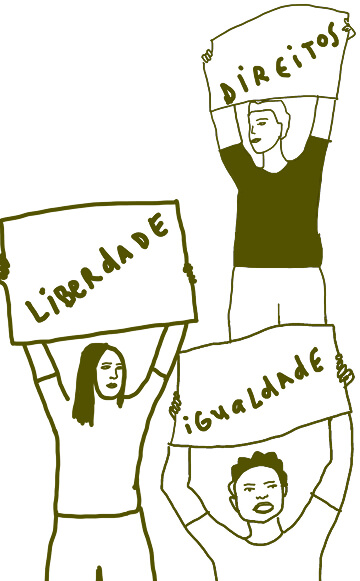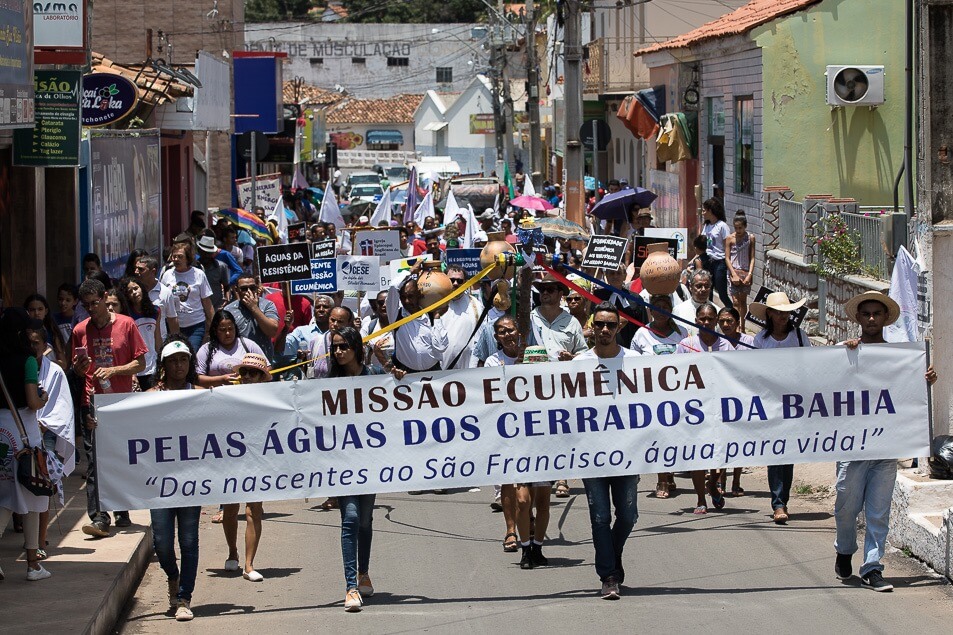- Home
- About CESE
ABOUT CESE
The Ecumenical Coordination of Service (Coordenadoria Ecumênica de Serviço: CESE) is an ecumenical organization composed of six Christian churches, founded in 1973 as an expression of ecumenical commitment to the defence of human rights. From the beginning, its purpose has been the promotion, guidance, support and monitoring of ecumenical service activities, across the entire nation, but particularly in the North and Northeast. It foundation was based on guidelines that grew out of the Meeting for Consultation on North-Northeast Inter-Ecclesiastical Assistance in Brazil, which was held in Salvador, Bahia, in 1972.
It is currently composed of the following churches:
A BRIEF
HISTORY
Created at the height of the military dictatorship CESE sought to offer a sign of hope by adopting an ecumenism of service aimed at the defence of rights, in other words a politicized service to meet the needs of the social movements and support effective measures to change the conditions of the most vulnerable, marginalized and excluded populations. Since then, CESE has asserted a new concept of diakonia, going beyond the welfare approach, tackling the causes of Brazil’s main social problems and positioning itself alongside the most vulnerable, seeking modes of organization, mobilization and education that transform reality.


For five decades, CESE has functioned as a point of convergence between the churches, sources of funding and grassroots movements. It has focused its activities on grassroots social movements and action expressed through various forms of organization: community cooperation; associations, cooperatives, and grassroots groups; churches, ecumenical and other faith-based organizations; local, regional and national social movements; networks, forums and other forms of networking. Priority organizations are those that identify with the ethical principles that guide CESE’s work, have a capacity for mobilization and for the construction of community alternatives and/or seek to intervene in public policy at various levels (from the local to the national), and demonstrate the potential to run coordinated activities.
CESE is also a point of convergence between those organizations that support and those that are supported, be these ecumenical and/or social movements, and always in the sense of caring for the common house, in defence of justice, democracy and for the construction of good living.
MISSION
To strengthen social movements, ecumenical and inter-religious movements, grassroots groups and other organizations involved in the struggle for the political, economic, social and environmental transformations that lead to structures in which democracy with justice prevails, from a Human Rights perspective and for the integrity of the common house.
PRINCIPLES
CESE’s activities are based on the following ethical principles:
INSTITUTIONAL AIMS
CESE’s permanent, long-term Institutional Aims are as follows:
01
To strengthen grassroots social movements and organizations.
02
To strengthen ecumenism and inter-religious dialogue and support for grassroots causes.
03
To ensure its own institutional robustness and sustainability over time.
CESE IN
NUMBERS
SEE WHAT THEY SAY ABOUT US
CESE was set up during the most violent year of the Military Dictatorship, when torture had been institutionalized, when arbitrary imprisonment, killings and the disappearance of political prisoners had intensified. The churches had the courage to come together and create an institution that could be a living witness of the Christian faith in the service of the Brazilian people. I’m so happy that CESE has reached its 50th anniversary, improving as it matures.
Over these 50 years, we have received the gift of CESE’s presence in our communities. We are witness to how much companionship and solidarity it has invested in our territories. And this has been essential for us to carry on the struggle and defence of our people.
You have to praise CESE’s capacity to find answers so as to extend support to projects from traditional peoples and communities, from family farming, from women; its recognition of the multiple meanings of the right to land, to water and to territory; the importance of citizenship and democracy, including environmental racism and the right to identity in diversity in its discussion agenda, and its support for the struggles and assertion of the values of solidarity and difference.
When we hear talk of the struggles of the peoples of the waters, of the forests, of the semi-arid region, of the city peripheries and of the most varied organizations, we see and hear that CESE is there, at their side, without replacing the subjects of the struggle. Supporting, creating the conditions so that they can follow their own path. It is this spirit that we, at ASA, want you to maintain. We wish you long life in this work to support transformation.
In the name of historical and structural racism, many people look at us, black women, and think that we aren’t competent, intelligent, committed or have no identity. Our experience with CESE is different. We are a diverse group of black women. We are in varied places and have varied stories! It’s important to know this and to believe in us. Thank you CESE, for believing in us. For seeing our plurality and investing in us.
I am a macumba devotee, but I love being with partners whose thinking is different from ours and who respect our form of organization. CESE is one such partner: it helps to build bridges, which are so necessary to ensure that freedom, diversity, respect and solidarity can flow. These 50 years have involved a lot of struggles and the construction of a new world.


























